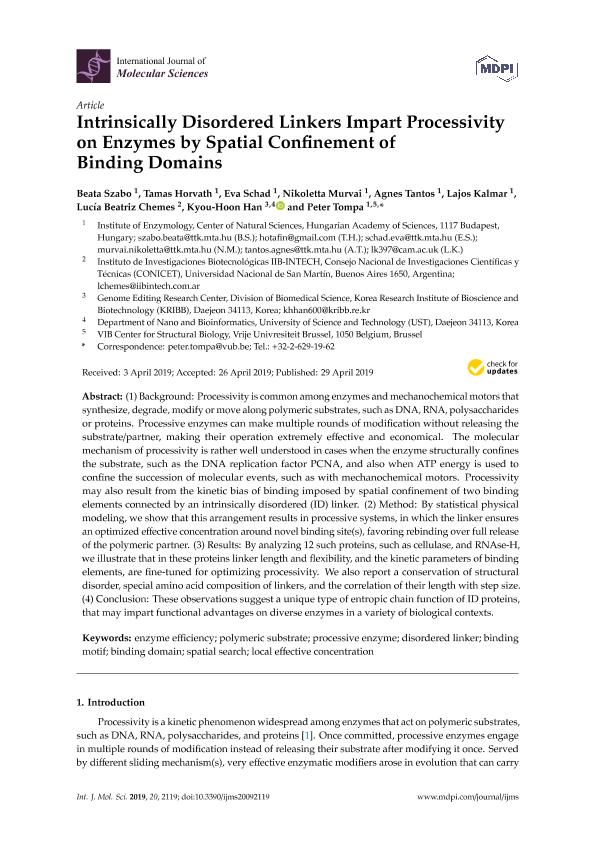Artículo
Intrinsically disordered linkers impart processivity on enzymes by spatial confinement of binding domains
Szabo, Beata; Horvath, Tamas; Schad, Eva; Murvai, Nikoletta; Tantos, Agnes; Kalmar, Lajos; Chemes, Lucia Beatriz ; Han, Kyou Hoon; Tompa, Peter
; Han, Kyou Hoon; Tompa, Peter
 ; Han, Kyou Hoon; Tompa, Peter
; Han, Kyou Hoon; Tompa, Peter
Fecha de publicación:
05/2019
Editorial:
Multidisciplinary Digital Publishing Institute
Revista:
International Journal of Molecular Sciences
ISSN:
1661-6596
e-ISSN:
1422-0067
Idioma:
Inglés
Tipo de recurso:
Artículo publicado
Clasificación temática:
Resumen
(1) Background: Processivity is common among enzymes and mechanochemical motors that synthesize, degrade, modify or move along polymeric substrates, such as DNA, RNA, polysaccharides or proteins. Processive enzymes can make multiple rounds of modification without releasing the substrate/partner, making their operation extremely effective and economical. The molecular mechanism of processivity is rather well understood in cases when the enzyme structurally confines the substrate, such as the DNA replication factor PCNA, and also when ATP energy is used to confine the succession of molecular events, such as with mechanochemical motors. Processivity may also result from the kinetic bias of binding imposed by spatial confinement of two binding elements connected by an intrinsically disordered (ID) linker. (2) Method: By statistical physical modeling, we show that this arrangement results in processive systems, in which the linker ensures an optimized effective concentration around novel binding site(s), favoring rebinding over full release of the polymeric partner. (3) Results: By analyzing 12 such proteins, such as cellulase, and RNAse-H, we illustrate that in these proteins linker length and flexibility, and the kinetic parameters of binding elements, are fine-tuned for optimizing processivity. We also report a conservation of structural disorder, special amino acid composition of linkers, and the correlation of their length with step size. (4) Conclusion: These observations suggest a unique type of entropic chain function of ID proteins, that may impart functional advantages on diverse enzymes in a variety of biological contexts.
Archivos asociados
Licencia
Identificadores
Colecciones
Articulos (IIBIO)
Articulos de INSTITUTO DE INVESTIGACIONES BIOTECNOLOGICAS
Articulos de INSTITUTO DE INVESTIGACIONES BIOTECNOLOGICAS
Citación
Szabo, Beata; Horvath, Tamas; Schad, Eva; Murvai, Nikoletta; Tantos, Agnes; et al.; Intrinsically disordered linkers impart processivity on enzymes by spatial confinement of binding domains; Multidisciplinary Digital Publishing Institute; International Journal of Molecular Sciences; 20; 9; 5-2019; 1-18
Compartir
Altmétricas



